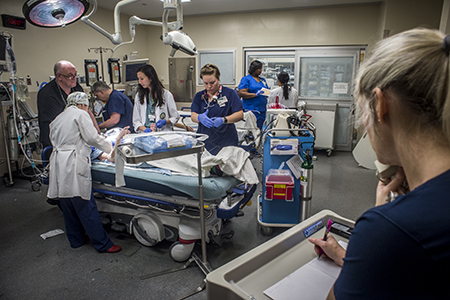Editor's Note: The information published in this story is accurate at the time of publication. Always refer to uab.edu/uabunited for UAB's current guidelines and recommendations relating to COVID-19.
 File photo of the UAB emergency department trauma bay, pre-COVID-19.As the much anticipated — and much feared — second wave of coronavirus sweeps across the county, emergency room physicians at the University of Alabama at Birmingham repeat a message they first voiced last spring as the virus ramped up. Do not avoid going to a hospital emergency department if you are facing a medical emergency.
File photo of the UAB emergency department trauma bay, pre-COVID-19.As the much anticipated — and much feared — second wave of coronavirus sweeps across the county, emergency room physicians at the University of Alabama at Birmingham repeat a message they first voiced last spring as the virus ramped up. Do not avoid going to a hospital emergency department if you are facing a medical emergency.
“One unfortunate result of the novel coronavirus pandemic is that people are scared to go to an emergency room when they have a medical issue that requires emergency care,” said Andrew Edwards, M.D., interim chair of the UAB Department of Emergency Medicine. “People experiencing heart attack, stroke or other significant health issues should not delay getting medical care for fear of contracting the virus.”
Edwards says UAB’s three emergency departments — the freestanding facility at Gardendale, Highlands Hospital and the main UAB Hospital — have taken the necessary precautions to prevent the possible spread of infection.
Patients arriving at any of the UAB EDs are provided with masks upon arrival, and are screened for COVID-19 symptoms. Patients with symptoms are kept apart from patients without symptoms. The waiting areas have been reconfigured to help maintain social distancing of 6 feet, and all ED staff wear masks at all times.
“Everyone who works in an ED is involved in maintaining a clean and secure facility, from nurses and physicians to our environmental services employees, registration staff, chaplains and patient care technicians,” Edwards said. “The emergency department is, and has been, a pretty safe place right now as far as COVID-19 is concerned.”
The emergency departments have also begun to utilize telemedicine technology, especially with follow-up visits with patients. UAB Hospital has also created special units for COVID-19 patients, so patients who come in via the emergency department and need to be hospitalized for non-coronavirus issues have no contact with COVID-19-positive patients.
“We have been aggressive with proper hygiene, social distancing, use of personal protective equipment and other steps to keep our staff, and our patients, safe,” Edwards said. “The bottom line is simple: If you are experiencing a medical emergency and you don’t come to the emergency department or call 9-1-1, you may be missing your window for lifesaving therapies.”